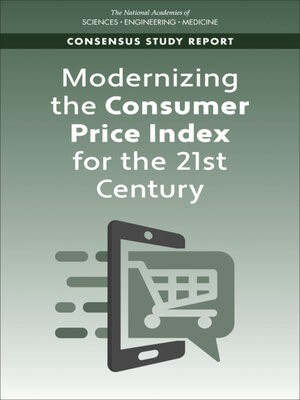Modernizing the Consumer Price Index for the 21st Century
ebook
By National Academies of Sciences, Engineering, and Medicine

Sign up to save your library
With an OverDrive account, you can save your favorite libraries for at-a-glance information about availability. Find out more about OverDrive accounts.
Find this title in Libby, the library reading app by OverDrive.



Search for a digital library with this title
Title found at these libraries:
| Library Name | Distance |
|---|---|
| Loading... |
The Consumer Price Index (CPI), produced by the Bureau of Labor Statistics (BLS), is the most widely used measure of inflation in the U.S. It is used to determine cost-of-living allowances and, among many other important private- and public-sector applications, influences monetary policy. The CPI has traditionally relied on field-generated data, such as prices observed in person at grocery stores or retailers. However, as these data have become more challenging and expensive to collect in a way that reflects an increasingly dynamic marketplace, statistical agencies and researchers have begun turning to opportunities created by the vast digital sources of consumer price data that have emerged. The enormous economic disruption of the COVID-19 pandemic, including major shifts in consumers' shopping patterns, presents a perfect case study for the need to rapidly employ new data sources for the CPI.
Modernizing the Consumer Price Index presents guidance to BLS as the agency embarks on a strategy of accelerating and enhancing the use of scanner, web-scraped, and digital data directly from retailers in compiling the CPI. The report also recommends strategies for BLS to more accurately estimate the composition of households' expenditures - or market basket shares - by updating this information more frequently and using innovative survey techniques and alternative data sources where possible. The report provides targeted guidance for integrating new data sources to improve the CPI's estimation of changes in the prices of housing and medical care, two consumer expenditure categories that are traditionally difficult to measure. Because of the urgency of issues related to income and wealth inequality, the report also recommends that BLS identify data sources that would allow it to estimate price indexes defined by income quintile or decile.







